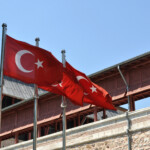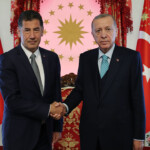‘A deeper look at the opposition’s record reveals an ugly truth. Despite the conventional wisdom, the CHP woefully failed in its historic mission to defend the core tenets of democracy, while Erdoğan continued to trample Turkey like a bulldozer.’
Western observers often tended to conceive Turkey’s main opposition actor, the Republican People’s Party (CHP), as the only capable contender to challenge President Recep Tayyip Erdoğan and his AKP.
According to a longstanding view, the CHP would unseat Erdoğan from power, especially after the shattering earthquake in February exposed the fatal nature of one-man rule, and the endemic corruption that enveloped the ruling party amid a flagging economy.
Turkey is often described as a “competitive authoritarian regime” or “electoral autocracy.” Has the CHP really challenged the policies that caused Freedom House to rank Turkey as “not free?” What has CHP done to combat the tide of authoritarianism that swept through Turkey’s political landscape?
A deeper look at the opposition’s record reveals an ugly truth. Despite the conventional wisdom, the CHP woefully failed in its historic mission to defend the core tenets of democracy, while Erdoğan continued to trample Turkey like a bulldozer. And it even enabled the strongman by endorsing many of his purges and crackdowns, looking the other way while Kurdish lawmakers were sent to prison.
Below is an index of the CHP’s follies and complicity, which may be said to be one of the building blocks of Erdoğan’s regime.
The Turkish Constitutional Court’s intervention in 2007’s presidential election:
During the election of the new president in Parliament in 2007, the CHP came up with the unprecedented argument that the quorum for the election was 367 deputies in the Assembly (of 550 seats in total), in the absence of which the election might not legally be held. With such an argument, the CHP boycotted the election, in order for the quorum not to be reached.
The CHP then took the matter to the Turkish Constitutional Court (AYM)—which was at that time composed of mostly pro-CHP judges—and asked the court to annul the election. The AYM eventually did so, which prevented Abdullah Gül (then was the Foreign Minister) from becoming president.
Thus, CHP and AYM paved the way for the AKP to play the victim. The AKP immediately called for a snap election and achieved a historical victory. Abdullah Gül eventually became the 11th President of Turkey. This inexcusable political mistake triggered the transition to a system of popular election of the president, and laid the foundations for Erdoğan’s one-man rule.
AYM’s annulment of a constitutional amendment upon CHP’s application in 2008:
In 2008, with the support of 411 deputies, the parliament passed a constitutional amendment that would end the headscarf ban in the public sector, which had always been a social and legal issue, so politically loaded that Islamist politicians were enthusiastic to exploit it. Ending the ban would certainly have deprived the likes of AKP of ever doing so.
As soon as the amendment was passed, the CHP filed a lawsuit with the AYM for annulment of the amendment on 27 February 2008. This lawsuit was followed by a closure case against the AKP, filed by the country’s chief prosecutor on 14 March 2008.
AYM annulled the amendment while dismissing the closure case with a lenient monetary fine. Emerging from that crisis victoriously—and politically stronger—Erdoğan consolidated his voter base. If the conservative electorate still offer their unwavering support to Erdoğan and do not switch to the CHP, despite systemic corruption and enormous economic woes engulfing the country, that is the reason why.
Handing Erdoğan the Council of Judges and Prosecutors (HSYK) on a plate:
The 2010 constitutional amendment meant that judges and prosecutors would be able to elect members of the HSYK, the judiciary’s governing body. The amendment, as originally proposed by the government and overseen by the Venice Commission, was intended to prevent any group from taking control of the HSYK. It provided that voters (judges and prosecutors) would only be able to cast one vote for ten seats.
The aim was to prevent the majority from dominating the CPJ and to have a diverse, multi-vocal council. However, the CHP took the matter back to the AYM, arguing that each voter should be able to cast one vote for each seat. The AYM accepted the CHP’s request and annulled the amendment. This move allowed the government to have its own candidates elected to the council.
Condoning Erdoğan’s Purge within the judiciary and police following the corruption probes – 17-25 December 2013
When the biggest corruption scandal in the history of the country broke out in the end of December 2013, the immediate reaction of Erdoğan and his interior minister, who were personally implicated, was to purge the police officers and law enforcers who were conducting the investigation.
The CHP did nothing to ensure that the investigations would run their course, let alone take meaningful steps to hold the AKP government accountable before the Parliament. It rather chose to watch passively as Erdoğan carried out an unprecedented purge of the judiciary and the police. Its attitude was: “Let the Gülenists and the AKP destroy each other, so that we can benefit from it”.
2014 presidential election: Wrong Candidate
In the 2014 presidential election, one of the country’s most important turning points, the main opposition party failed to find a candidate other than Ekmeleddin İhsanoğlu, a then 70-year-old Islamist academic with no experience in politics. Following a disastrous opposition campaign, İhsanoğlu unsurprisingly lost to Erdoğan, and later became his ally.
The elections of 7 June 2015 – “exploratory talks”
When the AKP fell into shock after failing to win a parliamentary majority for the first time in 13 years, the CHP did not dare—or bother—to ask President Erdoğan to give them the authority to seek to form a [coalition] government. Instead, The AKP’s Ahmet Davutoğlu, then Prime Minister, lulled the CHP with so-called exploratory talks before returning the authority to form a government back to President Erdoğan, who instead of giving it to the CHP called for snap elections. After a tumultous campaign period, marred by violence and bombings, the AKP ended victoriously again, with a record 49% of the votes.
Vote to lift parliamentary immunity, in 2016:
Under the guise of fighting corruption, then-Prime Minister Davutoğlu prepared a plan to lift the immunity of deputies who were under “legal investigation.” The proposal was to add a provisional article to the constitution that would enable lifting the immunities at the time the provisional article was adopted.
It was clear that the real purpose was to strip the pro-Kurdish HDP deputies of immunity. CHP leader Kılılçdaroğlu responded to this proposal by saying, “A measure which is against the constitution has been put forward. We know that, but we will say ‘Yes’ to it.” This ‘yes’ led to the arrest of 13 HDP deputies, including its co-chairs Selahattin Demirtaş and Figen Yüksekdağ.
The European Court of Human Rights eventually ruled that both the provisional article lifting the immunities and the arrests of Kurdish MPs were unlawful. Nevertheless, the CHP helped Erdoğan to neutralize his main rival Demirtaş.
Legitimizing a referendum held under the state of emergency in 2017:
In 2017, Erdoğan held a constitutional referendum to transform the country’s parliamentary system into a powerful executive presidency. The referendum was held under a state of emergency with 13 Kurdish MPs and 82 mayors in prison.
The CHP did not effectively oppose holding a referendum under such circumstances as it was complicit in the imprisonment of Kurdish MPs. What is worse, in the referendum, 2,5 million unauthenticated (not duly stamped) ballots were used.
Considering that Erdoğan won the referendum by 1.3 million votes, the result was, quite understandably, dubious. The CHP however was unexpectedly quick to accept the results of the referendum which effectively established Erdoğan’s one-man regime.
Legitimation of the State of Emergency which lasted from 2016 to 2018:
The CHP did not effectively challenge the AKP’s destruction of rule of law and democracy with a barrage of emergency decrees. While Erdoğan wiped out free media and civil society and removed all elected Kurdish mayors from office, the CHP did almost nothing. Its deputies defended the actions of the AKP government in the Council of Europe and PACE: they have voted against the monitoring process by the CoE. They sat aloofly in parliament in Ankara and continued to receive their salaries.
Supporting military operations in Syria:
The CHP supported military operations in Syria (at least until 2021 when the CHP voted against them), which Erdoğan used to increase his power base. For example, when Erdoğan launched a military operation in Syria in October 2019 to reverse his poor approval ratings, after losing the mayorships of both Istanbul and Ankara for the first time since coming to power in 2003, the CHP supported the operation, which caused deep disappointment among the Kurdish population which had backed CHP candidates in Ankara and Istanbul.
Cooperation with the AKP in the 2021 elections for members of the Council of Judges and Prosecutors (HSK):
When the AKP-MHP bloc did not have enough seats in Parliament to elect the new members of the HSK, the CHP-IYI party bloc made an immoral deal with them: in exchange for 3 seats in the CJP, the CHP-IYI party bloc supported the candidates of the AKP-MHP bloc. This handed the AKP the opportunity to argue that the HSK is impartial, having the approval of 450 deputies.
Thus, Erdoğan did not build his autocratic regime in a single day. Like many other dictators or autocrats, despite his dislike of democracy, Erdoğan remained keen to engage in electoral politics, to give the appearance of submitting to democratic procedures.
He actually said in 1996 that “Democracy is like a tram ride: when you reach your stop, you step out.” While he was inch by inch doing what he had then revealed, the complicity of Turkey’s main opposition CHP helped Erdoğan achieve all of his political goals.
The views and opinions expressed above are the author’s and do not reflect those of the Free Turkish Press.


